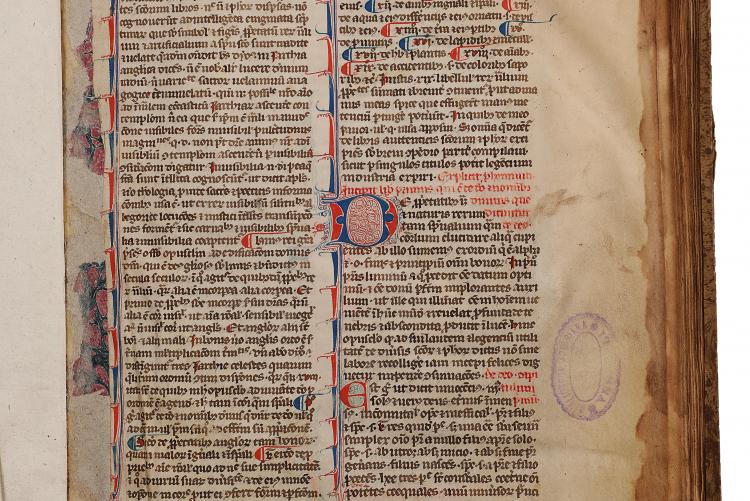Ante 1365 - Pergamena, legatura in mezza pelle su assi di cartone, 275x355 mm - Biblioteca diocesana Agnesiana, Vercelli
- La Biblioteca diocesana Agnesiana conserva il codice contenente De proprietatibus rerum di Bartholomew de Glanville, detto l’Anglico.
L’autore è un minorita inglese del XIII secolo, impegnato nello studio della filosofia, della teologia; naturista. Studia ad Oxford e poi in Francia, dove assume il titolo di bacelliere biblico all’Università di Parigi.
Dal 1231 insegna in Sassonia. Intorno al 1250 compone De proprietatibus rerum, un’opera a carattere enciclopedico in diciannove libri, che raccoglie molti aspetti del sapere conosciuto: la scienza di greci e latini, la patristica, la filosofia delle grandi religioni monoteistiche, la teologia medievale.
Interessanti gli aspetti legati al possesso dell’esemplare durante i secoli: dalle attestazioni ai frati Eremitani di Sant’Agostino di Biella fino ai riferimenti cinquecenteschi legati al priore di San Paolo in Vercelli. - The Biblioteca Diocesana Agnesiana keeps the code containing "De proprietatibus Rerum" by Bartholomew de Glanville known as the Anglico ("the English"). The author is an English Franciscan friar who lived in the XIII century. He was engaged in the study of Philosophy, Theology; a naturist. He studied in Oxford and later in France where he gets the title of Academic of the Bible at the University of Paris.In 1231 he starts teaching in Saxony. In 1250 he writes " De Proprietatibus Rerum", an opera similar to an encyclopedia made up of 19 books in which he collects all the knowledge available at the time ; Greek and Latin science, Patrology, the Philosophy of the great monotheistic religions and Medieval Theology.
The aspects about the possession of this document over the centuries are interesting : from the attestations of the Eremite Friars of St. Augustine of Biella, to the sixteenth century references connected to the Prior of St. Paul in Vercelli. - La Biblioteca diocesana Agnesiana converse le code incluant De proprietatibus rerum de Bartholomew de Glanville, dit l’Anglais.
L’auteur est un Frère mineur anglais du XIII siècle, engagé dans l’étude de la philosophie, de la théologie ; naturopathe. Il étudie à Oxford et par la suite en France, où il prend le titre de bachelier biblique à l’Université de Paris.
A partir de 1231 il enseigne en Saxe. Autour de 1250 il écrit De proprietatibus rerum, une œuvre à caractère encyclopédique en dix-neuf volumes, qui résume beaucoup d’aspects du savoir connu : la science des grecs et des latins, la patristique, la philosophie des grands religions monothéistes, la théologie médiévale.
Les aspects liés à la possession de l’exemplaire au cours des siècles sont intéressants : des attestations aux frères Ermites de Saint Augustin jusqu’aux références du XVI siècle liées au prieur de Saint Paul à Vercelli.
